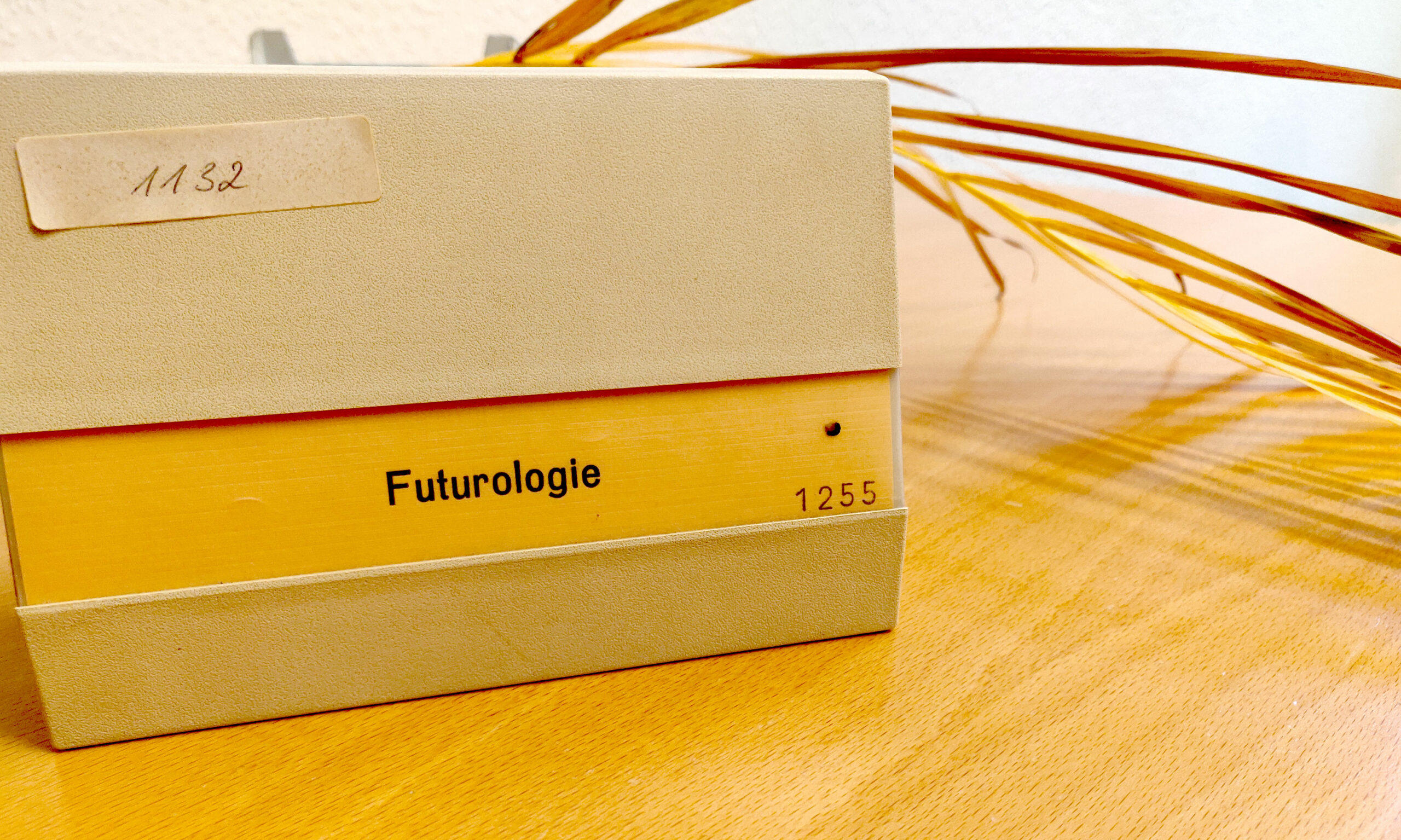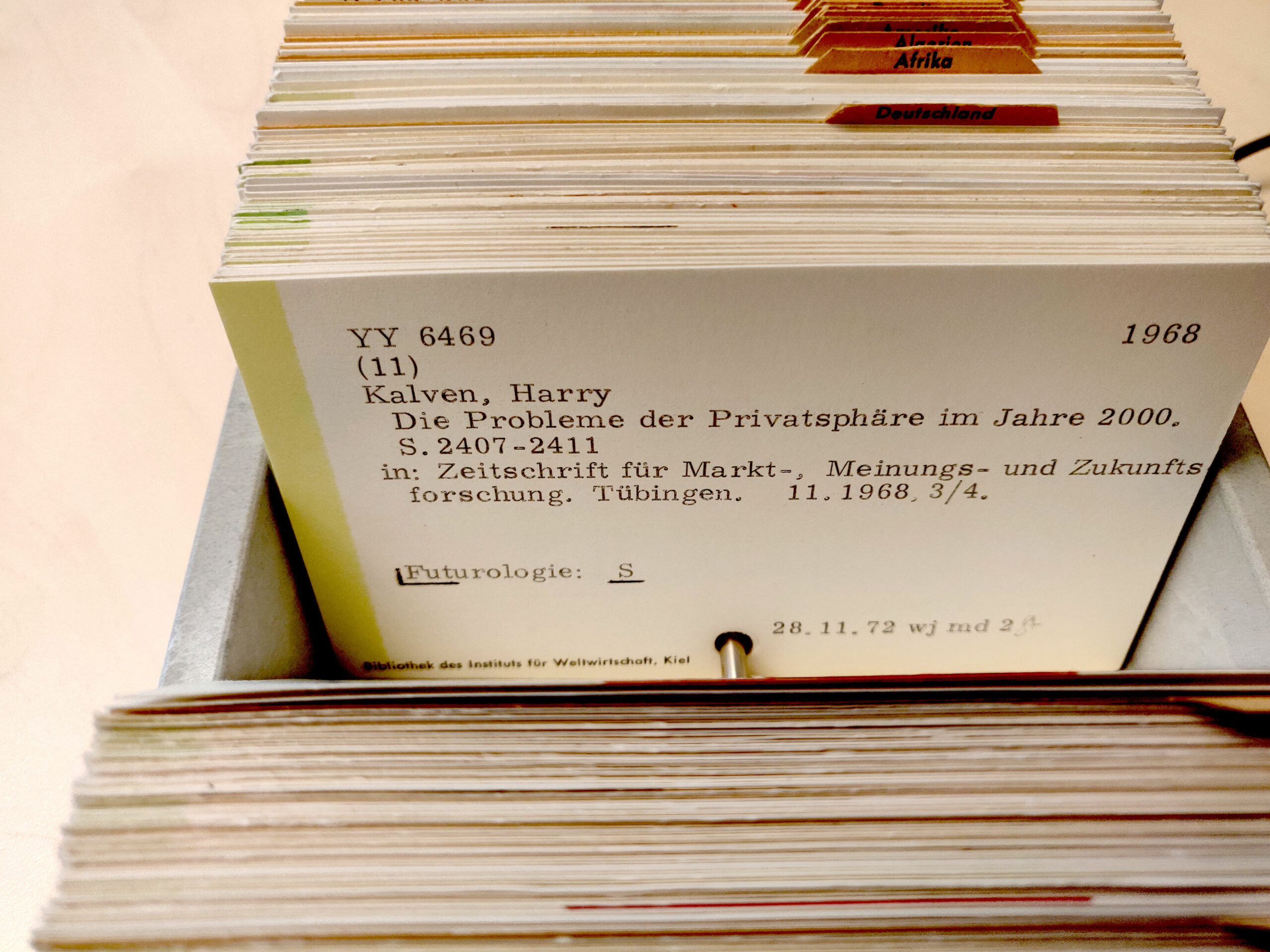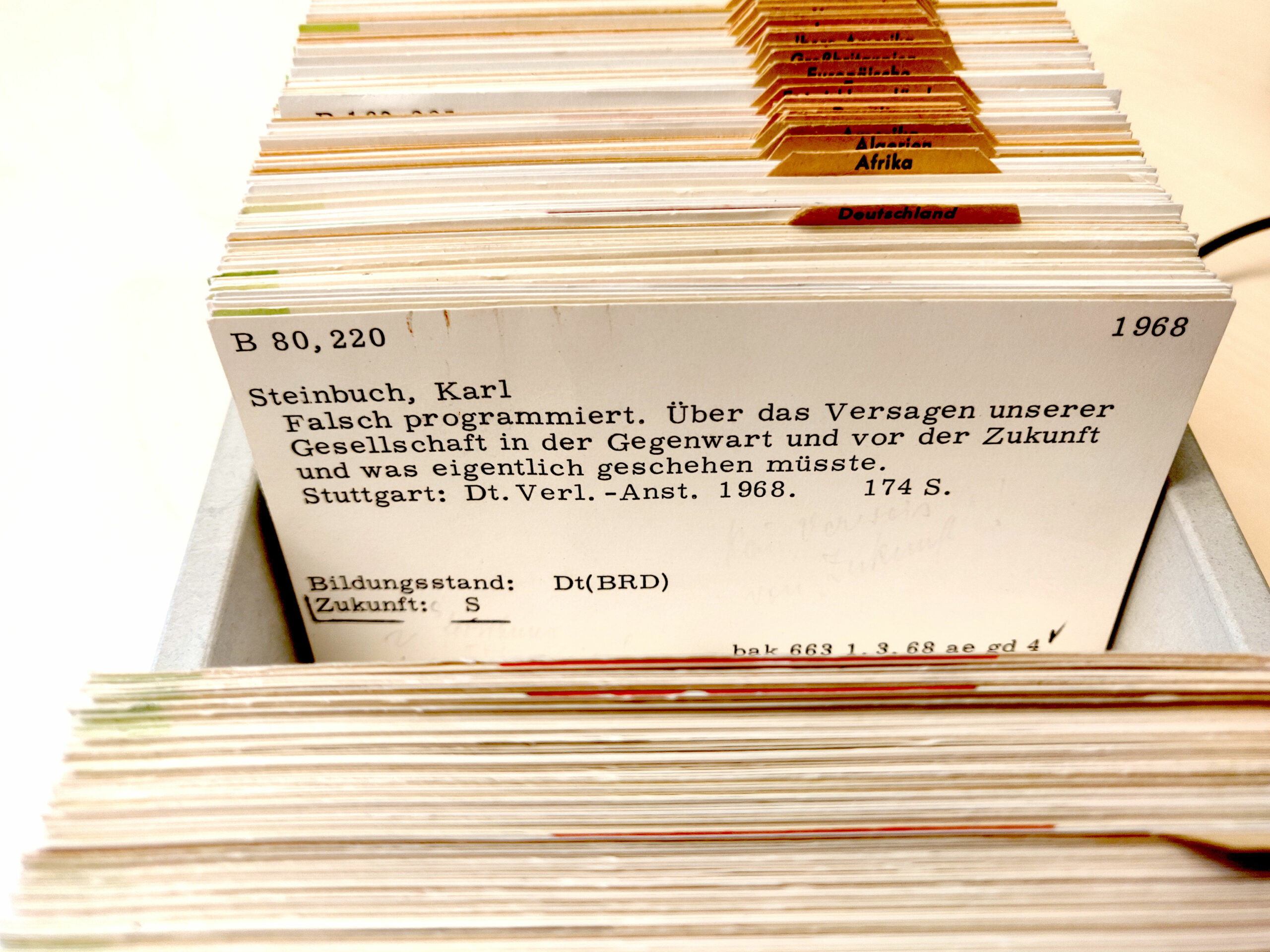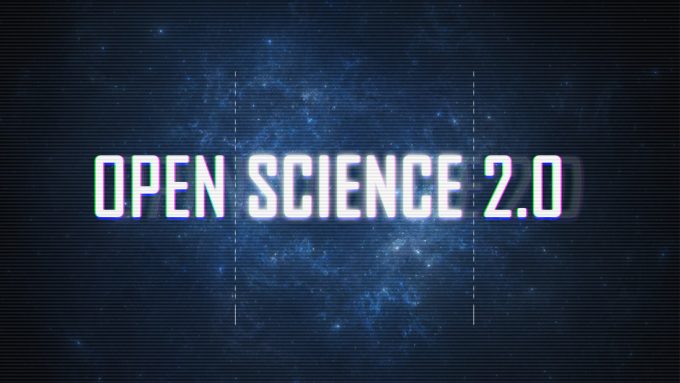
Back to the Future: Amazing Discoveries in a Futurology Card Index from the 1980s
Card indexes are yesterday’s news and belong in the waste-paper bin? Not everyone agrees: The prospect of the carefully compiled "futurology" card index being disposed of jolted Anna Kasprzik into action and enticed them to undertake a spontaneous rescue operation, with subsequent evacuation to their office. With a twinkle in her eye, Anna Kasprzik shares the best finds and some clairvoyant glimpses of the future from back then in this article.
by Anna Kasprzik

The principle of knowledge organisation
Semantics is the study of meaning, and knowledge organisation is semantics made explicit. A great deal of the time I have spent studying, engaged with my Ph.D., and working has been taken up with these two topics and I particularly love eccentric examples of them, such as Luhmann’s card index (German).
During my librarian traineeship in Munich, our subject indexing lecturer Gabriele Meßmer left a lasting impression on me when she told us how, many years ago, she had to beg for three years (!) as a little light at a large German library to be allowed to sort cards into the subject catalogue, because at that time only officially qualified subject indexers in the higher service were allowed to do so – I guess that at some point she wore down the resistance of her superiors. Later she was very eager to follow how the library world entered into electronic data-processing, initially with punch cards … and, after several decades of persistent work on the topic, she became one of the leading lights in the world of committees and education regarding subject indexing in the German library system. Now she is retired. Her unwavering passion for knowledge organisation moved and inspired me.
A few years ago, when I had recently arrived at ZBW, I was therefore delighted to be allowed to rummage around in the card indexes in Kiel, which contained the precursors of the Thesaurus for Economics (STW) … and was pleased to find a set of particularly interesting cards. I was all the more alarmed when I heard rumours this spring that these boxes were to “go over the ramp” (or something like that, I couldn’t help thinking of “walk the plank”) – “oh no! I absolutely have to save ‘futurology’!” 😮

Photo 1: Futurology card index
Fortunately I was able to infect my superiors with my impetuosity and in a cloak and dagger operation (ok, it was actually during a regular site trip to Kiel in broad daylight), I was allowed to “extract” the box and evacuate it via the internal mail to my office in Hamburg, where it is now safely stored. Since then, this box has been an endless source of amusement whenever I need a break from the more serious side of our work.
A melange of meta-levels resembling an Escher painting
Why was I so fascinated by “futurology” in particular? Or to put it the other way round: What’s not to like? For nerdy semantics enthusiasts, futurology and this box with cards dating from the 1960s to the 1980s represent a huge crazy bouquet of meta-levels and mind-blowing twists – a (not-at-all complete) list:
- In bygone days people thought about the future, and I am now in their future, thinking about the people who in the past thought about the future …
- Futurology (also known as future studies) isn’t merely concerned with the future, however, but with the science of thinking about the future …
- The cards in this box deal with literature that represents the contemporary view of the science of how one should best think about the future and how people are thinking about the future …
- … and the knowledge organisation system back then tried to use the keyword “futurology” to classify literature that represents the contemporary view of the science of how … and so on.
How many meta-levels is that already? Never mind, I’m feeling pleasantly dizzy.
I was also fascinated to discover how much one can glean from the titles – without having read the listed publications themselves! – about the attitude to life at that time, and perspectives at that time on the next century, and how shockingly visionary or also how shockingly up-to-date these perspectives still are. Some things were simply amusing, others made me choke on a cynical laugh.
I thought I would share a few examples with you in this blog post and add my two cents’ worth ( ➡ ) as well.
An astonishingly clairvoyant potpourri of visions

“Too stupid for the future? People from yesterday in the world of tomorrow” (German, publ. by Theo Löbsack, 1971)
➡ Apparently, people were scared of being left behind 50 years ago as well…

“The desire for doom. Pessimistic future prognoses, a modern illness?” (German, Ivo Frenzel, special issue “Zukunft konkret”, 1978)
➡ Now we can answer this question too: Whether it’s illness or a valid immune response, it is still rampant – you simply have to scroll through Twitter for half an hour.

“The most dangerous years since the Ice Age. Our future up to the year 2000” (German, Karl Deutsch, “Presentations in the context of the gala to celebrate the 50th anniversary of the Edeka juniors group”, 1980)
➡ “The most dangerous years”? Wait until the year 2020, you ain’t seen nothing yet …

“Only one working day per week in the future? Microelectronics and its social consequences” (German, Frank Niess, 1981)
➡ Also highly topical! From fears of being cast aside due to the progress of automation through to pandemic-accelerated flexibilisation of our working methods and work locations with the help of “microelectronics”… although: to my knowledge, Google and other Silicon Valley companies have not yet managed to compress working hours to a single day per week – dear Civil Service, perhaps a chance for you to make a name for yourself as being particularly innovative…? 😉

“The problems with personal privacy in the year 2000” (German, Harry Kalven, 1968 !! )
➡ There’s almost nothing more I can say about this. They SAW IT COMING! ALL OF IT!

“Wrongly programmed. About the failure of our society in the present and for the future, and what actually needs to happen (German, Karl Steinbuch, 1968)
➡ Also has a ring of familiarity to it! 😀 I really wanted to know what “actually needs to happen”, so I started searching for the book and here you are: number 226604144 in EconBiz (German). From the single-view page, you at least get to an amusing review in the Frankfurter Allgemeinen Zeitung (German, PDF, from 25.09.1968 )- excerps:
-
“This book is aggressive: In an age of sensory overload, information no longer reaches its target without the vehicle of provocation.”
➡ No kidding.
“The object of this aggression is the ‘hidden world’, by which the author means everything that prevents us from developing a scientific culture based on research and technology.”
➡ Science sceptics! We know about them!
“A future superiority of computers over the human brain regarding all rational mental processes will make possible the establishment of a ‘cybernetic state’ superior to all previous forms of political organisation. […] “This requires a careful analysis of which principles are suitable for making human life possible and worth living in the engineered world of the future and dense mass society.” That gets to the heart of the matter. Who analyses? Who decides what is valuable and ethical?”
➡ The fear of “artificial intelligence” and all that “it” could come up with – that too is highly topical.
“But: [this also requires a new faith.] In the quality of the future person, who […] must have not only the opportunity, ‘to develop patterns of thinking and behaviour in freedom, which were previously unknown’. Who has to be not merely […] an original personality, which, as might be expected, does indeed require a high level of optimism, but who must also be more humane, a ‘better person’ in the deepest sense of this hackneyed term. This kind of ‘moral mutation’ would be an innovation in the history of homo sapiens.”
➡ And this 300 years after the dawn of the age of the Enlightenment … oh well. Sic transit gloria mundi. 😕
On that note: I hope that you enjoyed this trip “back to the future” and wish you all a pleasant turn of the year. Stay healthy and in good spirits!
P.S.: My journey down the rabbit hole with the previous publication went on ➡ my parents’ two cents’ worth:
Parent 1: “I think ‘Wrongly programmed’ is on the book swap shelf. I’ll go and see if it’s still there.”
Me: “I wonder if the author ever dreamed that he would end up on the book swap shelf …”
Parent 1: “That was a bestseller. Basically everyone had that book. That means there still must be a lot of copies around that are now being thrown out.”
Parent 2: “Yes, Steinbuch was a technocrat – he didn’t understand much about society. Many people had it in their cabinet at that time, including your grandfather. He was unpopular with the 1968ers and the young Green Movement.”
Ho-hum. 🙂
Read more
- Keynote: Forecast for the academic library of 2025: Cloudy with a chance of user participation and content lock-in from the conference „Emerging technologies in academic libraries“, Norway, 2012
- Book „Burning the Books – A History of Knowledge Under Attack“ by Richard Ovenden
- Unite against book bans
- Standard Thesaurus Economics completely revised: Transparently track the change in science and language (German)
More articles by and with Anna Kasprzik on ZBW MediaTalkk
- AI in Academic Libraries, Part 1: Areas of Activity, Big Players and the Automation of Indexing
- AI in Academic Libraries, Part 2: Interesting Projects, the Future of Chatbots and Discrimination Through AI
- AI in Academic Libraries, Part 3: Prerequisites and Conditions for Successful Use
- Machine Learning How to Automate Subject Indexing
Dr Anna (Argie) Kasprzik, is the coordinator of the automation of subject indexing (AutoSE) at the ZBW – Leibniz Information Centre for Economics. Anna’s main focus lies on the transfer of current research results from the areas of machine learning, semantic technologies, semantic web and knowledge graphs into productive operations of subject indexing of the ZBW. You can also find Anna on Mastodon.
Portrait: ZBW©, photographer: Carola Gruebner
View Comments

EconStor Survey 2022: Repository Registers Satisfied Users, but More Marketing Efforts Needed
More than 13 years ago, the ZBW launched its repository EconStor. In 2022, the team...



